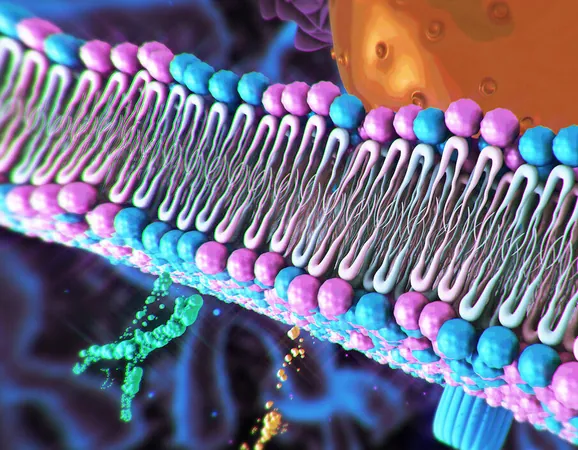
How Cancer Cells Use Lipids for Survival: New Insights into Immune Evasion
2024-09-17
Introduction
Recent groundbreaking research from Rockefeller University has unveiled a surprising twist in our understanding of cancer cell metabolism, revealing that lipids play a far more complex role than simply serving as an energy source. A study published in *Nature* has shed light on how certain lipids, particularly glycosphingolipids, are utilized by cancer cells not just for energy but also as a crucial mechanism for evading the immune system.
Historical Context
Historically, sphingolipids were a chemical enigma for scientists, reminiscent of the Sphinx in mythology, whose riddles were famously challenging to solve. This new study, titled "Glycosphingolipid synthesis mediates immune evasion in KRAS-driven cancer," tackles one of these longstanding mysteries and opens the door to potential new treatments.
Mechanism of Immune Evasion
Researchers discovered that cancer cells manipulate their lipid metabolism to hide from the immune system. By producing glycosphingolipids, these cells effectively silence signals that would typically attract immune responses. "We identified de novo sphingolipid synthesis as an essential pathway for cancer immune evasion," states Dr. Mariluz Soula, the lead investigator. Blocking this production not only boosts the effectiveness of immune cell attacks —such as those from natural killer and CD8+ T cells—but also potentially paves the way for new therapeutic approaches.
Research Methodology
The research team employed a combination of functional genomics and lipidomic techniques to target the metabolic pathways of cancer. They initially screened gene involvement by implanting various cancer cells, each lacking specific genes tied to lipid metabolism, into mice. This allowed them to pinpoint which lipids were critical for the cancer's survival and growth. Contrary to earlier beliefs, the study suggests that the elevated lipid levels are not merely providing energy to fuel tumor expansion; instead, they serve as a sophisticated camouflage enabling cancer cells to evade immune recognization.
Key Findings
One of the most remarkable findings indicates that reducing glycosphingolipid levels increases the presence of specific receptors on cancer cells' surfaces, which could trigger an immune response. Moreover, combining established treatments, like checkpoint blockade therapy with drugs inhibiting glycosphingolipid synthesis, showed significant enhancement of the anti-tumor immune response.
Clinical Implications
An intriguing aspect of the study involved an FDA-approved drug initially designed for Gaucher disease, a disorder that hampers lipid breakdown. Researchers found that this drug effectively diminished tumor growth across various cancer models, including pancreatic and colorectal cancers. The results suggested that by disrupting the glycosphingolipid production, cancer cells lose their protective barrier against immune attacks.
Broader Implications
Soula emphasized the research's broader implications: "This discovery reveals that lipids are not merely energy sources but critical components in how cancer cells modulate communication with the immune system." This finding compels a re-evaluation of lipid profiles in cancer therapies and paves the way for innovative dietary and pharmacological strategies aimed at disrupting lipid metabolism specifically in cancer cells.
Future Research Directions
Looking ahead, researchers are keen to investigate if these insights apply universally across various cancer types. While the current focus is on KRAS-driven cancers, known for their aggressive behavior, the potential of these findings to enhance immunotherapy effectiveness could transform cancer treatment paradigms.
Conclusion
In conclusion, the emerging narrative is that understanding and targeting lipid metabolism in cancer cells might just be the key to unlocking new avenues for treatment and enhancing the immune system's ability to combat cancer. As the research community continues to decode the complexities of cancer biology, a unique strategy may lie in modulating dietary and drug interventions to support immune attack against tumors.

 Brasil (PT)
Brasil (PT)
 Canada (EN)
Canada (EN)
 Chile (ES)
Chile (ES)
 España (ES)
España (ES)
 France (FR)
France (FR)
 Hong Kong (EN)
Hong Kong (EN)
 Italia (IT)
Italia (IT)
 日本 (JA)
日本 (JA)
 Magyarország (HU)
Magyarország (HU)
 Norge (NO)
Norge (NO)
 Polska (PL)
Polska (PL)
 Schweiz (DE)
Schweiz (DE)
 Singapore (EN)
Singapore (EN)
 Sverige (SV)
Sverige (SV)
 Suomi (FI)
Suomi (FI)
 Türkiye (TR)
Türkiye (TR)